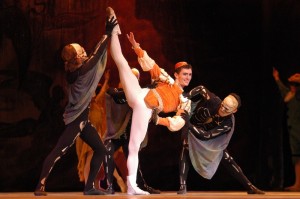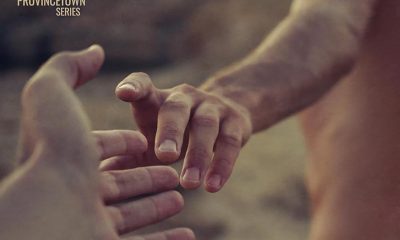Arts & Entertainment
Diversity dancing
Companies of all genres have performances slated for coming weeks

A scene from 'Romeo and Juliet' as performed by the Russian National Ballet Theatre. The company will be at George Mason in April. (Photo courtesy of the Ballet)
It’s a busy spring for dance in D.C., starting this weekend with an avant-dance group “Pomo Afro Homos,” with its “pomo” or “post-modern” stories from black gay life from San Francisco’s Castro District. It returns to D.C.’s Dance Place Saturday and Sunday only, each night at 8.
Think of this show as the badass dancers of queer performance. It’s the same group that rocked Dance Place in the ’90s, but is now remixed with a fresh crew of talent and attitude. Tickets are $22 ($17 for members, seniors, students, as well as teachers and artists). Dance Place is at 3225 8th Street N.E. Purchase tickets at danceplace.org or call 202-269-1600.
Coming at 8 p.m. Wednesday at Montgomery College, in its Guest Artist Series with “Stars of the Bolshoi,” is Bolshoi Ballet principal dancers Mario Mashina and Andrei Bolitin at the College’s Parilla Performing Arts Center, 51 Mannakee St. in Rockville. For tickets ($40 and $38), call the box office at 240-567-5301 or visit montgomerycollege.edu.
Coming in April to George Mason University in Virginia is the Russian National Ballet Theatre, called by the Washington Post “a cut above many of its rivals,” and performing three of classics: “Romeo and Juliet” April 9 and “Swan Lake” on April 10, both at GMU’s Center for the Arts at its Fairfax campus, and on April 19 “Sleeping Beauty,” at its Manassas campus at the Hylton Center. Tickets for the first two ($27-$54) and the third ($30-$46) are at 888-945-2468 or visit cfa.gmu.edu.
The Atlas Intersections festival also features theater, music and film, as well as other dance performances, including “Mirandy and Brother Wind,” a world premiere dance operetta for families that follows young Mirandy on a quest to win a cakewalk contest by capturing the perfect partner — Brother Wind. A collaboration of Adventure Theatre with the African Continuum Theatre Company, “Mirandy” is performed Saturday at 11 a.m, 2:30 p.m. Sunday and also March 11-13. Tickets are $15, for ages 5 and up.
Also consider on Saturday at 5 p.m. and Sunday at 7 p.m. a dance-theater fantasy from Word Dance Theater: “Preludes: Duncan, Sand and Chopin,” where the feminist writer George Sand encounters the revolutionary choreographer and dancer Isadora Duncan, united by their passionate encounter with the “Preludes” of Sand’s lover, the composer Frederic Chopin. Tickets are $30, $20 students.
At the Kennedy Center, March 22-24 in its Eisenhower Theater, is the 16-member Paul Taylor Dance Company, a contemporary dance company formed by one of the foremost American choreographers of the 20th century, the last living member of the pantheon that created America’s indigenous art of modern dance. Dubbed by Martha Graham “the naughty boy of dance,” Taylor, who was born in 1930 and grew up in and around D.C., is gay. His cutting-edge repertory is often highly erotic, including three works this time: “Three Dubious Memories,” “Brief Encounters” and “Also Playing.” For tickets ($22-$65), visit kennedy-center.org or the box office or call 800-444-1324.
Finally, the lord of the dance beckons you also, and it’s D.C.’s only square dance club, D.C. Lambda Squares. The Squares will offer free intros to modern Western square dancing in April, and single dancers are warmly welcomed. Visit dclambdasquares.org/info for details.

Team DC, the umbrella organization for LGBTQ-friendly sports teams and leagues in the D.C. area, held its annual Night of Champions Awards Gala on Saturday, April 20 at the Hilton National Mall. The organization gave out scholarships to area LGBTQ student athletes as well as awards to the Different Drummers, Kelly Laczko of Duplex Diner, Stacy Smith of the Edmund Burke School, Bryan Frank of Triout, JC Adams of DCG Basketball and the DC Gay Flag Football League.
(Washington Blade photos by Michael Key)




















The 2024 National Cannabis Festival was held at the Fields at RFK Stadium on April 19-20.
(Washington Blade photos by Michael Key)
















Covering the @NatlCannaFest at RFK Stadium for @WashBlade . Stop by the LGBTQ+ booth and pick up a paper if you are here. pic.twitter.com/is7hnsaPns
— Michael Patrick Key (@MichaelKeyWB) April 20, 2024
Theater
‘Amm(i)gone’ explores family, queerness, and faith
A ‘fully autobiographical’ work from out artist Adil Mansoor

‘Amm(i)gone’
Thorough May 12
Woolly Mammoth Theatre
641 D St., N.W.
$60-$70
Woollymammoth.net
“Fully and utterly autobiographical.” That’s how Adil Mansoor describes “Amm(i)gone,” his one-man work currently playing at Woolly Mammoth Theatre.
Both created and performed by out artist Mansoor, it’s his story about inviting his Pakistani mother to translate Sophocles’s Greek tragedy “Antigone” into Urdu. Throughout the journey, there’s an exploration of family, queerness, and faith,as well as references to teachings from the Quran, and audio conversations with his Muslim mother.
Mansoor, 38, grew up in the suburbs of Chicago and is now based in Pittsburgh where he’s a busy theater maker. He’s also the founding member of Pittsburgh’s Hatch Arts Collective and the former artistic director of Dreams of Hope, an LGBTQ youth arts organization.
WASHINGTON BLADE: What spurred you to create “Amm(i)gone”?
ADIL MANSOOR: I was reading a translation of “Antigone” a few years back and found myself emotionally overwhelmed. A Theban princess buries her brother knowing it will cost her, her own life. It’s about a person for whom all aspirations are in the afterlife. And what does that do to the living when all of your hopes and dreams have to be reserved for the afterlife?
I found grant funding to pay my mom to do the translation. I wanted to engage in learning. I wanted to share theater but especially this ancient tragedy. My mother appreciated the characters were struggling between loving one another and their beliefs.
BLADE: Are you more director than actor?
MANSOOR: I’m primarily a director with an MFA in directing from Carnegie Mellon. I wrote, directed, and performed in this show, and had been working on it for four years. I’ve done different versions including Zoom. Woolly’s is a new production with the same team who’ve been involved since the beginning.
I love solo performance. I’ve produced and now teach solo performance and believe in its power. And I definitely lean toward “performance” and I haven’t “acted” since I was in college. I feel good on stage. I was a tour guide and do a lot of public speaking. I enjoy the attention.
BLADE: Describe your mom.
MANSOOR: My mom is a wonderfully devout Muslim, single mother, social worker who discovered my queerness on Google. And she prays for me.
She and I are similar, the way we look at things, the way we laugh. But different too. And those are among the questions I ask in this show. Our relationship is both beautiful and complicated.
BLADE: So, you weren’t exactly hiding your sexuality?
MANSOOR: In my mid-20s, I took time to talk with friends about our being queer with relation to our careers. My sexuality is essential to the work. As the artistic director at Dreams of Hope, part of the work was to model what it means to be public. If I’m in a room with queer and trans teenagers, part of what I’m doing is modeling queer adulthood. The way they see me in the world is part of what I’m putting out there. And I want that to be expansive and full.
So much of my work involves fundraising and being a face in schools. Being out is about making safe space for queer young folks.
BLADE: Have you encountered much Islamophobia?
MANSOOR: When 9/11 happened, I was a sophomore in high school, so yes. I faced a lot then and now. I’ve been egged on the street in the last four months. I see it in the classroom. It shows up in all sorts of ways.
BLADE: What prompted you to lead your creative life in Pittsburgh?
MANSOOR: I’ve been here for 14 years. I breathe with ease in Pittsburgh. The hills and the valleys and the rust of the city do something to me. It’s beautiful, it’ affordable, and there is support for local artists. There’s a lot of opportunity.
Still, the plan was to move to New York in September of 2020 but that was cancelled. Then the pandemic showed me that I could live in Pittsburgh and still have a nationally viable career.
BLADE: What are you trying to achieve with “Amm(i)gone”?
MANSOOR: What I’m sharing in the show is so very specific but I hear people from other backgrounds say I totally see my mom in that. My partner is Catholic and we share so much in relation to this.
I hope the work is embracing the fullness of queerness and how means so many things. And I hope the show makes audiences want to call their parents or squeeze their partners.




















